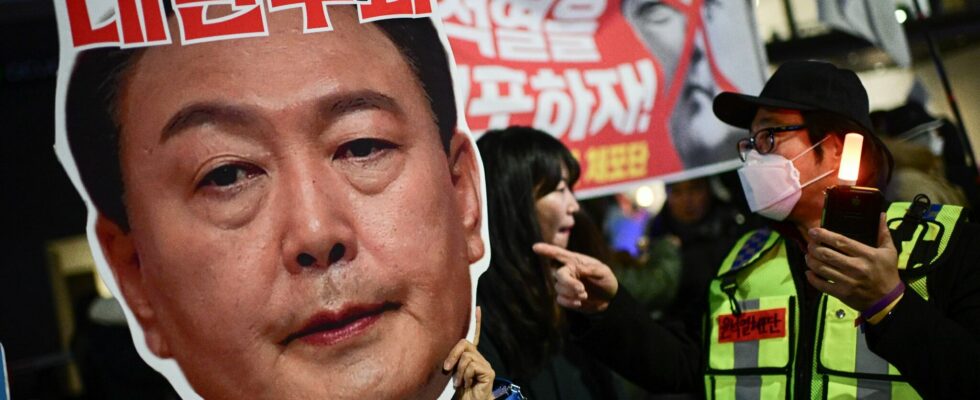New twist in South Korea. This Wednesday, December 11, the police claimed to be hampered in their search of the offices of President Yoon Suk-yeol. For a week, the president has been indicted after his attempt to impose martial law.
Police said in the morning that a “special investigation team” had “conducted a search at the presidential office, the National Police Agency, the Seoul Metropolitan Police Agency and the Security Department of the National Assembly. In the middle of the afternoon, a spokesperson explained to Agence France Presse that investigators had “accessed the civil services office” of the complex. “However, we are currently unable to enter the main building due to access restrictions imposed by presidential security officers,” he added. The presidency was not immediately available for comment on Wednesday.
Yoon Suk-yeol stunned the country by imposing martial law by surprise on the night of December 3 to 4, before being forced to repeal it six hours later under pressure from Parliament and the streets. He has since narrowly escaped a motion for dismissal submitted to a vote by the National Assembly, saved by his party. But the main opposition force, the Democratic Party, has set a second vote in this direction for Saturday 5 p.m. local time, a spokesperson told AFP. If eight MPs from Yoon Suk-yeol’s People Power Party (PPP) support this new motion, it could be adopted. At the first attempt on December 7, only two voted for the motion. Since Tuesday, three others have announced they will do so as well.
Targeted by an investigation for “rebellion”, the unpopular President Yoon Suk-yeol, 63, is prohibited from leaving the territory, as are his former ministers of Defense and the Interior, and the commander of the brief martial law . Two senior police officials were also arrested Wednesday morning, according to the institution.
Suicide attempt by a minister
Also this Wednesday, the authorities also reported that the former Minister of Defense in office at the time of the short-lived martial law, Kim Yong-hyun, had attempted suicide in detention, a few minutes before his formal permitted arrest. by issuing a warrant against him. Accused of having played a “crucial role during a rebellion” and committing an “abuse of power to obstruct the exercise of rights”, he had already been in detention since Sunday but a warrant was necessary to extend it. The Justice Department and a prison official said he was fine. “The entire responsibility for the situation rests solely on me,” Kim Yong-hyun said on Tuesday in a statement carried by his lawyers.
Kim Yong-hyun was also accused by opposition parliamentarians of having ordered the sending of drones into the city of Pyongyang, apparently to create a casus belli with the North, which would have served as a pretext for the proclamation of martial law.
Yoon Suk-yeol, constantly defeated by a National Assembly largely aligned with the opposition, had justified his decision to impose martial law by his desire to protect South Korea from “North Korean communist forces” and “eliminate elements hostile to the State”. Helicopters and soldiers were deployed to Parliament to prevent MPs from meeting there and voting to lift his decree. But 190 of them managed to enter and unanimously adopt the end of this state of exception.
South Korea, mocked by the North
On Tuesday, a working group of the People’s Power Party proposed a road map on the withdrawal of the head of state. She envisages the resignation of Yoon Suk-yeol in February or March, with a new presidential election in April or May. This plan has not yet been accepted by the entire PPP party. Even if that were the case, it is unlikely that the opposition would give up trying to bring down the president. According to the PPP, the latter left governance to its party and to Prime Minister Han Duck-soo. “Despite my continued opposition to the declaration of martial law […] I ultimately failed to prevent it,” the latter explained in a statement on Wednesday, saying he was “sincerely sorry”.
Reacting to the events for the first time on Wednesday, North Korea compared the failed attempt to impose martial law to a military coup, accusing the South Korean president of trying to lead a “fascist dictatorship.” An article published Wednesday on page six of the North Korean state newspaper Rodong Sinmun claims that Yoon Suk-yeol’s “senseless act” is “similar to the coup d’état during the military dictatorship years ago decades,” reports the BBC. The Rodong Sinmun newspaper also said the events in Seoul had “revealed the weakness of South Korean society.” The sudden declaration of martial law “is an expression of despair,” said this source, according to whom “Yoon Suk-yeol’s political life may end prematurely.”
